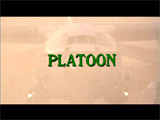
|
Platoon
(1986)
In Oliver Stone's Best Picture-winning war film about
combat duty in Vietnam in the late 1960s, a harrowing, visceral,
realistic, and visually-shattering Vietnam-war film with many dark
or night scenes of hand-to-hand and close-range combat with VCs:
- during work duty, the first of many narrated (voice-over)
messages of enlisted, idealistic rookie soldier, Private Chris
Taylor (Charlie Sheen) to his Grandma about how he had given up
college to volunteer for military service in Bravo Company (25th
Infantry Division) somewhere near the Cambodian border; he talked
about how he was a new recruit and his life wasn't worth much,
and how he had made a big mistake: "Somebody once wrote: 'Hell
is the impossibility of reason.' That's what this place feels like.
Hell. I hate it already and it's only been a week. Some god-damn
week, Grandma. The hardest thing I think I've ever done is go on
point three times this week - I don't even know what I'm doing.
A gook could be standing three feet in front of me and I wouldn't
know it. I'm so tired. We get up at 5 am, hump all day, camp around
four or five, dig a foxhole, eat, then put out an all-night ambush
or a three-man listening post in the jungle. It's scary, 'cause
nobody tells me how to do anything 'cause I'm new, and nobody cares
about the new guys. They don't even want to know your name. The
unwritten rule is a new guy's life isn't worth as much 'cause he
hasn't put his time in yet - and they say, if you're gonna get
killed in the Nam, it's better to get it in the first few weeks,
the logic being you don't suffer that much. If you're lucky, you
get to stay in the perimeter at night and then you pull a three-hour
guard shift, so maybe you sleep three, four hours a night, but
you don't really sleep. I don't think I can keep this up for a
year, Grandma. I think I made a big mistake comin' here..."
- the statement of the film's major conflict - the
struggle for the
"possession of the (my) soul" of Private Taylor as he continued
his narration while on patrol in the rain - he remembered how he had
given up college to volunteer for military service, and that he admired
other lowly and disposable "grunts"
(mostly teenaged male high-school dropouts from small towns, all poor,
black and Hispanic) as the "heart and soul" of the war effort,
used as infantry bait: "They're poor. They're the unwanted. Yet
they're fighting for our society and our freedom. It's weird, isn't
it? At the bottom of the barrel, and they know it. Maybe that's why
they call themselves 'grunts', 'cause a grunt can take it, can take
anything. They're the best I've ever seen, Grandma. The heart and soul..."
- he finished his narration - the ending to his first
letter - about how the war might teach him something about life as
a rite of passage: "Maybe I finally found it way down here in
the mud. Maybe from down here I can start up again and be something
I can be proud of, without having to fake it, be a fake human being.
Maybe I can see something I don't yet see, or learn something I don't
yet know. I miss you. I miss you very much. Tell Mom I miss her too.
Chris."
- the controversial scene in a Vietnamese village where
Taylor chastised a frightened, dim-witted one-legged man (Romy Sevilla)
and forced him to dance by firing at his legs ("Dance, one-legger!
Dance! Dance!...One-legged motherf--ker!"), and then war-mad
Bunny (Kevin Dillon) went even further and repeatedly pummeled him
in the face with the butt of his gun and bashed his brains in
- a continuation of the scene - the malevolent and murderous
Sgt. Bob Barnes (Tom Berenger) cold-bloodedly executed an innocent
but talkative elderly Vietnamese woman (the wife of the local chief),
and was prevented from murdering her young daughter (when he pointed
a .45 at her head) by intervention from Sergeant Elias Grodin (Willem
Dafoe); as the troops left, they burned the village to the ground
- the foxhole scene of Taylor with Sgt. Elias during
the night when Elias meditated and gave a 'critique' of the unwinnable
war and the US' dire prospects: "The stars. There's no right
or wrong in 'em. They're just there....What happened today is just
the beginning. We're gonna lose this war....We've been kickin' other
people's asses for so long, I figure it's time we got ours kicked"
- the film's major conflict -- embodied by the establishment
of two sides or lines in the schizophrenic battle, involving the
struggle for the "possession"
of Taylor's soul during a 'civil war' between Elias and Barnes, described
by Chris concisely stated in another letter: (Taylor: "I don't
know what's right and what's wrong anymore. The morale of the men is
low, a civil war in the platoon. Half the men with Elias, half with
Barnes. There's a lot of suspicion and hate. I can't believe we're
fightin' each other, when we should be fighting them")
- the long sequence during a Vietnamese jungle operation
that became a punishing firefight ambush, when callous, scar-faced
Staff Sergeant Barnes ordered an airlift evacuation for all the dead
and wounded in his platoon. Then, the sociopathic Barnes stalked
after Sgt. Elias who had become separated from the platoon in the
deep jungle. When he located him, he calmly shot his long-time opponent
three times in the chest, and left him for dead; t he malevolent
Barnes told questioning Chris who came upon him: "Elias is dead.
Fall back with the platoon...Yeah, he's back there about 100 meters...He's
DEAD! There's 'gooks' all over the god-damn place. Get movin'."
- however, as they departed from the helicopter pickup
area, Chris noticed a seriously-wounded soldier ("They've got
Elias") being pursued, retreating, and running (in slow-motion)
from a group of NVA soldiers firing at him (Radio operator: "There's
still one on the deck down there"); the saintly and compassionate
Sgt. Elias staggered out of the jungle after being shot by sociopathic
Sgt. Barnes and left for dead in the Vietnamese jungle - his arms
outstretched upwards in slow-motion in a sacrificial, crucifixion
pose (while Samuel Barber's Adagio For Strings was played)
as he was repeatedly shot and fatally hit by VC enemy forces - viewed
from a chopper overhead in grandiose fashion - before he could be
taken aboard; next to him in the chopper, Chris directed a knowing,
revolted stare at Sgt. Barnes, realizing that Barnes had played a
key role in Elias's death and had left him behind

|
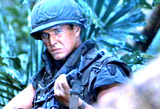
|
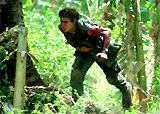
|
|
Sgt. Barnes Shooting Elias
|
Wounded Elias Running Into View
|
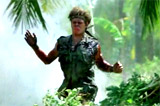
|
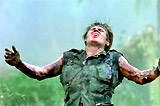
|

|
|
Sgt. Elias' Crucifix Death Pose
|
- after a major NVA assault, with most of the platoon
killed, Taylor came upon a severely-wounded and insane Barnes and
when the Sgt. grimly demanded: "Get me a medic. Go on, boy!",
Chris refused and raised his rifle; Barnes contemptuously gave
him permission: "Do it" - and he was shot three times
in the chest as revenge and retribution for Sgt. Elias' death

|
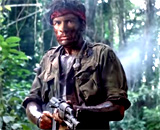
|
|
Sgt. Barnes Shot Dead by Taylor
|
- in the conclusion, wounded Chris' final overwhelming
thoughts after being carried on a stretcher for evacuation by a
helicopter as he saw the devastation below and craters full of
corpses - ("I think now, looking back, we did not fight the
enemy. We fought ourselves, and the enemy was in us. The
war is over for me now, but it will always be there for the rest
of my days...")
|

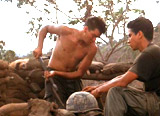

Private Taylor During Work Duty



On Patrol in the Rain


Bunny (with Taylor) Terrorizing a Vietnamese Man


Sgt. Barnes Threatening to Kill Daughter

Sgt. Elias Intervening Against Barnes

Torching the Village

Elias Meditating on the War
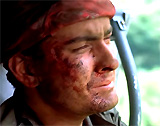
Wounded Chris' Final Thoughts
|















